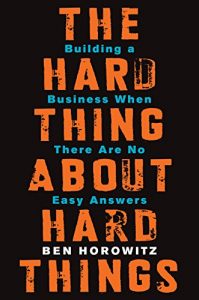 When I’m adding books to my reading list, I do my best to keep track of where the initial recommendation came from. It helps me to prioritize my reading list. There are sources I rely on that will move a book up my reading list, and certain sources that will advance a book to the top of it. For my latest read, The Hard Thing About Hard Things by Ben Horowitz, I didn’t have a recommendation source written down. It’s not that book wasn’t recommended. It’s that it was recommended by nearly every source that I use. They all gave it good reviews, especially if you were starting up or running your own business. Needless to say, I fit that description, so I decided I should prioritize the book for my 2016 reading list.
When I’m adding books to my reading list, I do my best to keep track of where the initial recommendation came from. It helps me to prioritize my reading list. There are sources I rely on that will move a book up my reading list, and certain sources that will advance a book to the top of it. For my latest read, The Hard Thing About Hard Things by Ben Horowitz, I didn’t have a recommendation source written down. It’s not that book wasn’t recommended. It’s that it was recommended by nearly every source that I use. They all gave it good reviews, especially if you were starting up or running your own business. Needless to say, I fit that description, so I decided I should prioritize the book for my 2016 reading list.
As a little back story, Ben Horowitz is the co-founder of the venture capital firm Andreesen Horowitz. Prior to that, he was the cofounder and CEO of Opsware, which was sold to HP in 2008 for $1.6B. Ben cofounded the company in 1999 (which was known as Loudcloud at the time), near the height of the “.com” boom. The Hard Thing About Hard Things is effectively a collection of the lessons he learned while leading the company through the turbulent times after the internet bubble burst in 2001.
As noted by my recommendation sources, the book is great for anyone involved in a startup, especially for someone who is running one. Whether your company is scaling up quickly or going through troubled times, the book will have good suggestions. Why? Well, Opsware was involved in both scenarios, as well as many others. In short, Horowitz details many of the lessons he learned from his first hand experience in hopes that he can help you avoid making them in your startup.
In general, I’m not a big fan of first hand, autobiographical startup stories. While they contain good lessons to learn, they can also be a bit self-congratulatory. They also have a way of slanting history to spin the founder into a positive light. In The Hard Thing About Hard Things, Horowitz does a good job of keeping things objective. He calls out both his successes and his failures, which is great. I find it useful to learn what not to do as much as what to do. I greatly appreciated the balance in the book. My only point to nitpick is that Horowitz overdoes it a bit on the battle scar stories. I understand why he uses them, but not all add to the flow of the book. Again, this is a minor nit, as it doesn’t detract from the book’s overall message.
So, while the book doesn’t fit into my wheel house of third party written company stories, I’m still putting it into my Must Read category of books. It’s primarily for those who are running their own business or contemplating starting one, but it’s applicable to anyone involved in a startup. It will give you a lot of insight into what it takes to make a startup succeed. It will also help you understand the mentality of your leadership team. On the other hand, if you’re not involved in the startup scene, especially the tech startup scene, you’ll want to pass on this one. I doubt you’ll get much out of it.

Pingback: My 2016 reading list - Gregg Borodaty
Pingback: Books to read - the 2017 edition - Gregg Borodaty